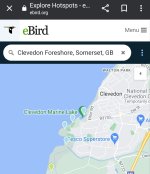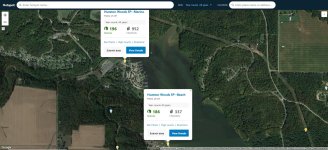Paul Chapman
Well-known member
The solution here is to either submit two checklists, one for each hotspot (this is what I do), or one checklist to a third location (either personal or a hotspot) that includes both hotspots. Especially locally, I tend to make as many checklists as there are hotspots to report them to. A thorough morning or afternoon at my local state park could include five or more checklists, all to different small hotspots. I could make one big list for the day and report it to the main park hotspot, but that's less precise, much less helpful to others, and it's also just fun to build lists for each hotspot.
Optimally, of course, hotspots would be area-based. The only problem is that would require knowledgeable local reviewers who actually care to accurately define the borders.
Agreed in principle.
However, the creation of Hotspots is independent from local reviewers & indeed, independent from dedicated local eBirders. In addition, the manner in which the App works can provide false legitimacy to what on occasions is an insane proliferation of individual Hotspots within a small area. Because of the App, some Checklists will be randomly assigned to different Hotspots only small distances apart. Unfamiliar visitors just select a Hotspot unaware that it is little used and in reality, it should not have been created.
In those circumstances, the last thing I will do is submit four different Checklists to what would otherwise be a single Checklist representing a defined one hour walk from home. 😀
All the best
Paul









